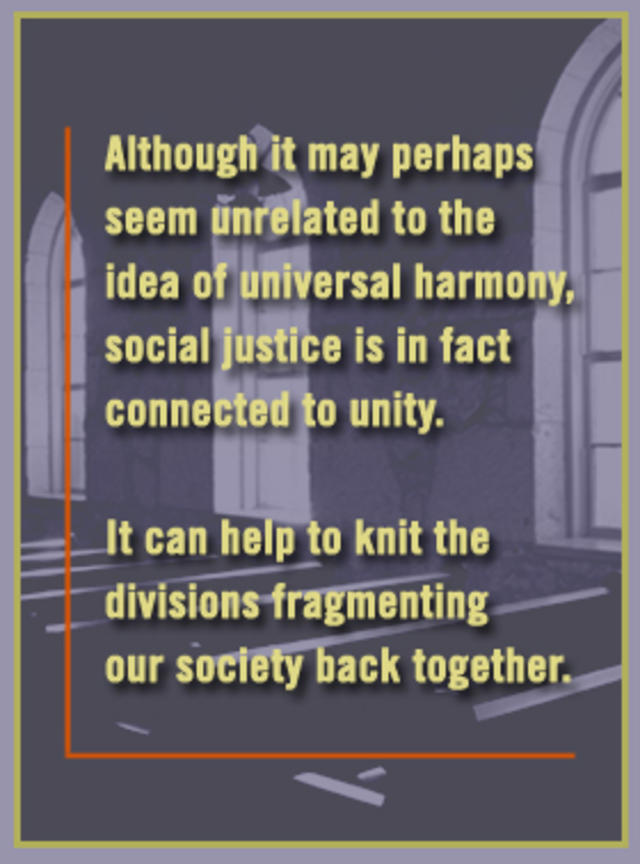Unitarianism: Universalism Unlimited

Unitarian Universalism (UU), the modern-day American version of Unitarianism — a religious tradition with a nearly 500-year history — is an open, multi-denominational religious tradition.
It lacks scripture and centralized authority, focusing rather on the individual spirituality of each believer. Although Unitarian Universalism emphasizes freedom, it does have several integral principles of belief. Perhaps the most basic of such notions is the idea of the absolute oneness of God. From this conception of fundamental unity, which is believed to exist both in God and humanity, comes the name “Unitarianism.” Overall, the notion of oneness defines Unitarian theology and thought. This religious tradition exemplifies a strand of uniquely American thought and belief.
The Unitarian church combined with the Universalist church in 1961 to create the Unitarian Universalism we know today. Though its roots are Christian, today’s UU churches lack structural authority — one of the most striking differences between Unitarian Universalism and other religious traditions. Besides the absence of a clergy class, no UU scripture exists. UU thought is unaffected by the codified prescriptions of religious texts. It is virtually unlimited. For the most part, divine authority is also absent from its doctrine. Because of the extreme focus on individualism and its myriad connotations, many Unitarian Universalists avoid the term “God” altogether, choosing rather to regard the divine as a spiritual force, perhaps akin to Christianity’s Holy Spirit. The structure of Unitarian Universalism allows for freedom not only religiously, but socially as well. Their vision for society is utterly un-dogmatic. As long as liberty and reason are protected, almost all is acceptable. This emphasis on independence is in stark contrast to the patterns that have established themselves across the arc of history.
Traditionally, there has been an inextricable connection between religious hierarchy and sociopolitical authority in monarchical governments. Unitarian Universalism bucks these historical trends, supporting a secular society whose governing structure is separate from religion. Throughout the course of history, religion has been the defining force in societies across the globe. Kings have claimed sovereignty under the auspices of God, Popes have waged wars and governed states, monarchs have served dually as religious and secular leaders. Religion imposed universal laws with powers derived from the intensity and pervasiveness of religious belief. In addition, the social power of many religions shares an underlying structure with politics. In Catholicism, the relationship between the pope, clergy, and lay people mirrors that of a king, nobles, and commoners. In fact, most religions with a clergy share this structure. Unitarian Universalism, however, is egalitarian, emphasizing individuality and the power of reason. In many ways, Unitarian Universalism is a rejection not only of traditional religious hierarchy, but of established sociopolitical roles as well.

Unitarianism’s rejection of traditional sources of authority mirrors that of the United States, one of the countries where it has had the most impact. The American struggle for independence was a rejection of the power of the British Monarchy and a move to a democratic state. Although the Revolutionary War and did not abolish social or political hierarchies, it allowed for the creation of an alternative structure based on equality. Our founding documents, although seemingly unrelated to Unitarianism, preach a doctrine of equality mirroring Unitarianism’s.
The most profound instance of Unitarian influence in American culture is in Transcendentalism, an influential American spiritual, philosophical, and literary movement of the early nineteenth century. Prominent Transcendentalists include Ralph Waldo Emerson, Henry David Thoreau and Walt Whitman. American Unitarians of the early nineteenth century regarded reason as the foundation of their religious tradition. Transcendentalism sprang from this tradition and then broke from it, emphasizing instead the individual’s immediate, intuitive spiritual relationship with the divine at any time and place, a concept we see later incorporated into Unitarian Universalism.
Another profound area of connection between Unitarian Universalism and American culture is the realm of social justice. Unitarian Universalism often attracts individuals with a strong sense of social responsibility — supporting justice, equality, and compassion is one of the seven principles that today’s congregations affirm. Although it may perhaps seem unrelated to the idea of universal harmony, social justice is in fact connected to unity. It can help to knit the divisions fragmenting our society back together. Thoreau in his essay “Civil Disobedience” argues that individuals should stop paying taxes in protest of government wrongdoing. He claims, “government is best which governs least,” echoing an individualist sentiment characteristic of strands of both Transcendentalism and Unitarianism — a sentiment that also promotes social justice. Thoreau also claims the inherent goodness of individuals: “The character inherent in the American people has done all that has been accomplished.” This is in keeping with the UU idea that individuals are innately good. It also captures the idea that individuals are ideal agents, which is the basis for self-reliance, the positive force in a Transcendentalist conception of society.
Ultimately, Unitarian Universalism parallels some of the most important trends in American society, both politically and socially. Historically, it has witnessed and withstood some the most important events in our country’s history, from the Civil War to women’s rights to same-sex marriage debates, managing to maintain its core all the while. The Unitarian tradition has not merely stood, however, as a bystander alongside the rolling tide of history. It has participated actively, and its ideals have been echoed throughout the society. The liberty, unity, and rationality that characterize Unitarian Universalism have all become uniquely American. Overall, it is a tradition that could be cast as an essential version of all the main American ideals, from freedom to civil disobedience; it is the epitome of what this country can be.

Naomi Chasek-MacFoy is a senior attending Bard High School Early College. She enjoys reading, playing soccer, and sewing and lives in Brooklyn, New York.
